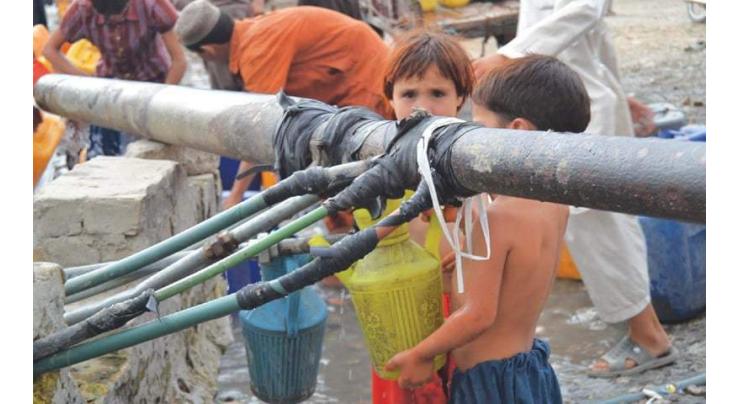
Balochistan's Water Crisis To Go By 2030: Noor Muhammad
Faizan Hashmi Published December 19, 2018 | 05:25 PM

Balochistan's geostrategic location, where world's most important project Gwadar Port is being carried out, could not even help as 75 percent of its dwellers have to wait for clean drinking water by 2030.
ISLAMABAD, (UrduPoint / Pakistan Point News - 19th Dec, 2018 ) :Balochistan's geostrategic location, where world's most important project Gwadar Port is being carried out, could not even help as 75 percent of its dwellers have to wait for clean drinking water by 2030.
Balochistan's Minister for Public Health Engineering Noor Muhammad Dummer said, "The government has announced water emergency in the province and is taking immediate steps to end the water shortage by 2030." The minister said they would establish three new water filtration plants in every district of the province to provide clean drinking water to the citizens.
All available resources would be utilized for the early completion of clean water projects, he added. He said an amount of more than 70.4 million rupees has been allocated for installing tube-wells and water treatment plants in Bhag district.
� � � � He said the government has a target to install at least three new water purification plants in every city during the current financial year, adding the steps would be taken to achieve the target and to ensure availability of safe drinking water to the people of the province.
� � � � Member Balochistan Assembly (MPA), Sana Ullah Baloch talking to APP said, "Only 25 per cent of Balochistan's dweller have access to clean drinking water,". The rural area of Balochistan province is facing severe water shortage as large part of its population has no access to portable water, seeking incumbent government's attention to ensure provision of clean drinking water to them.
Lauding the suo motu notice taken by the apex court over the availability of contaminated water to Bhag Narri and establishment of a commission, he said the Chief Justice of Pakistan Mian Saqib Nasir directed the provincial authorities to come up with their reports over the matter.
��� Sana Ullah Baloch said, "Over 27 percent people in Balochistan are getting water from open pounds; it meant that over 70 percent population's intake is toxic water from polluted water reservoirs, making them more prone to the hazadrous health complications." He said Dera Bugti was producing 60 percent natural gas of the country and generating Rs80 billion revenue whereas on the contrary clean drinking water accessibility to its dwellers was only 16 per cent.
Baloch said the Kharan and Washuk districts were also producing a large number of resources and keeping strategic significance of the region. "But, unfortunately the availability of pure water is only 9 to 7 percent in those areas," he deplored.
He said the same case was with Musakhail district which is one of the most backward districts of the province as it receives only 6 percent portable water and hence increasing their vulnerability against the diseases like Hepatitis and others.
He said the previous government has not integrated the socio-economic components of the China Pakistan Economic Corridor (CPEC) during its planning. He said 86 per cent of population was living below the multidimensional poverty line and 83 percent people were affected by malnutrition in the province.
He said the focus of CPEC was Gwadar whereas the district's two percent rural population was getting water through 180 tankers filled from Merani Dam where that water was stored for five to ten years full of filth and dangerous pollutants.
Related Topics
Recent Stories

Mired in crisis, Boeing reports another loss

Session Awarding Ceremony 2024 held at Cadet College Muzaffarabad

Austrian ski great Hirscher to make comeback under Dutch flag

Pakistan, Japan agrees to convene 'Economic Policy Dialogue'

FM Dar conveys deepest sympathy on torrential rains devastation in UAE

Spain PM Sanchez says weighing resignation after wife's graft probe

Tennis: ATP/WTA Madrid Open results - 1st update

Long-lost Klimt portrait auctioned off for 30 mn euros

Osaka seals first win on clay since 2022 in Madrid

Earthquake jolts Karachi

Sindh minister orders operation after attack on police in Ghotki

TikTok to fight US ban law in courts
More Stories From Pakistan
-
Pakistan, UK discuss collaboration in education sector
6 hours ago -
PMD forecast rain-windstorm/thunderstorm for various parts of country
6 hours ago -

Session Awarding Ceremony 2024 held at Cadet College Muzaffarabad
6 hours ago -

FM Dar conveys deepest sympathy on torrential rains devastation in UAE
7 hours ago -

Earthquake jolts Karachi
7 hours ago -

Sindh minister orders operation after attack on police in Ghotki
7 hours ago
-

Police book youngster for abusing student for one year
7 hours ago -

Police arrest 23 suspects, recover stolen money, phones
7 hours ago -

Colorful cultural festival concludes at NUML
7 hours ago -

Immunization awareness week kicks off in Balochistan
7 hours ago -

Ministers visit Aziz Bhatti Shaheed Hospital following roof collapse incident
7 hours ago -

IHC serves notices in petition against 'roti' price fixation
7 hours ago









